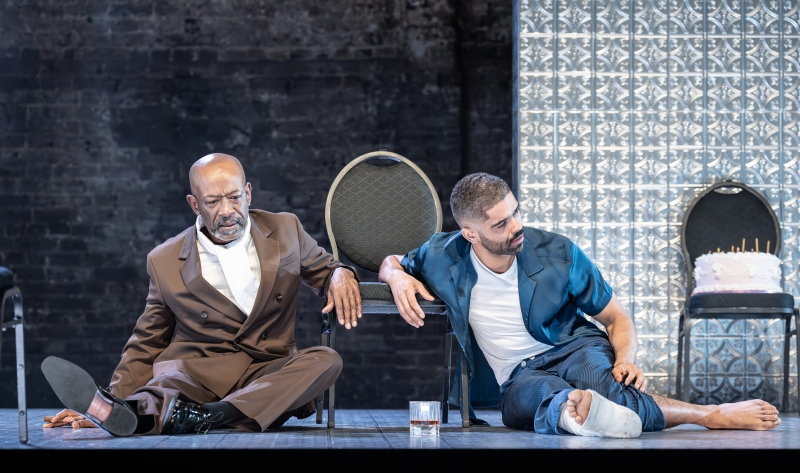Review: CAT ON A HOT TIN ROOF, Almeida Theatre
Tennessee Williams' masterpiece finds a natural contemporary resonance


After director, Rebecca Frecknall’s, triumphs at this theatre with Williams’ Summer and Smoke and A Streetcar Named Desire, and with leads, Daisy Edgar-Jones and Kingsley Ben-Adir, on a billboard near you, expectations were set for, if not a re-imagination of a classic with everyone in Kabuki masks, then certainly a warmish take. But not so, The writing shines through, occasionally seducing us, often bludgeoning us, ultimately exhausting us. Perhaps the creative team took to heart the advice given to medical students by their first teacher on assessing a patient - “Don’t just do something, stand there!”
Of course, no creative team is as passive as that when there’s a play to get on its feet. Choices are made, attention is pointed this way and that, emotions manipulated. For three hours or so, we cannot be passive either, as we follow the ebbs and flows of a family’s disintegration, see the past poke through the present and spike the future, see words and silences branded as weapons.
Aside from the accents and chat about the estate, there’s little sign of the original post-war Mississippi setting for the play. Chloe Lamford’s set has something of a corporate office breakout space about it (despite many references to doors, there are none), Moi Tran’s costumes are 21st century and speak of middlebrow affluence and a grand piano, played by a ghostly pianist, takes the eye and ear in times of tension. The family is mixed race (impossible not to feel history intruding there) but any implications arising from such casting is understated to the point of near-invisibility. This is an abstract space that encourages abstract thoughts.
Where Trump’s America does come through is in the key theme of truth and lies. The relationship between Brick (Ben-Adir, boozing and brooding) and his wife, Maggie (the feline, frustrated Edgar-Jones) is founded on the lie that he loved her. Maybe he did, but he definitely loved his dead school buddy, Skipper, but that love dare not speak its name. In Act Two, the central lie is that Big Daddy (Lennie James, with his alpha-male entitlement dialled to 11) can talk things out with the whiskey-addled Brick, but neither wants to hear what the other says. Come Act Three, the future for Brick and Maggie is founded on a lie and we leave fearful for its unravelling.
As November’s elections showed us, again, Americans unabashedly prefer comforting lies to hard truths, indeed the drama combusts when the hard truth of Big Daddy’s cancer diagnosis is revealed to him and Big Mama (Clare Burt, skilfully demonstrating the matriarch’s stupid inability to read the room). Brick’s disgust with mendacity, probably a reference to the double lives men like Williams were compelled to follow in the 1950s, now feels more political, more a condemnation of a world that embraces alternative facts when the actual facts are discomfiting.
The performances are fully committed through the cast, with Ben-Adir subtle in his drunken despair, Edgar-Jones incandescent in her Act One tirades directed at a husband who stopped engaging long ago, and Ukweli Roach and Pearl Chanda, skin-crawlingly avaricious as Big Daddy’s unloved elder son and fertile wife.
Though misery permeates the air (these people are just too incompatible to share the same air, instead ‘sharing the same cage’) there’s dark humour too in Big Daddy’s barbs, in Maggie’s fizzing contempt for her sister-in-law and in three children so obnoxious that Mr Wonka would have bumped them off in the first ten minutes. It helps that the speeches are so beautifully constructed, although how Maggie, once dirt-poor and terrified of being dirt-poor again, got to college to polish her innate intelligence into such insightful eloquence is never made clear,
Maybe it’s the carol singers in Upper Street or the Christmas lights, but such intensity across three hours is a stiff ask to maintain in the season of goodwill. Though analysis reveals a brilliantly written and skilfully executed drama, a synthesis suggests that the sum of those parts verges on the overwhelming, the aggregate of dysfunctionality testing one’s stamina even with an interval and a pause.
Like a kale smoothie from one of the chi-chi bars of Islington, this Cat on a Hot Tin Roof does you good, but it can be a trial finishing those last few mouthfuls.
Cat on a Hot Tin Roof at the Almeida Theatre until 1 February
Photo images: Marc Brenner
Reader Reviews

Videos


